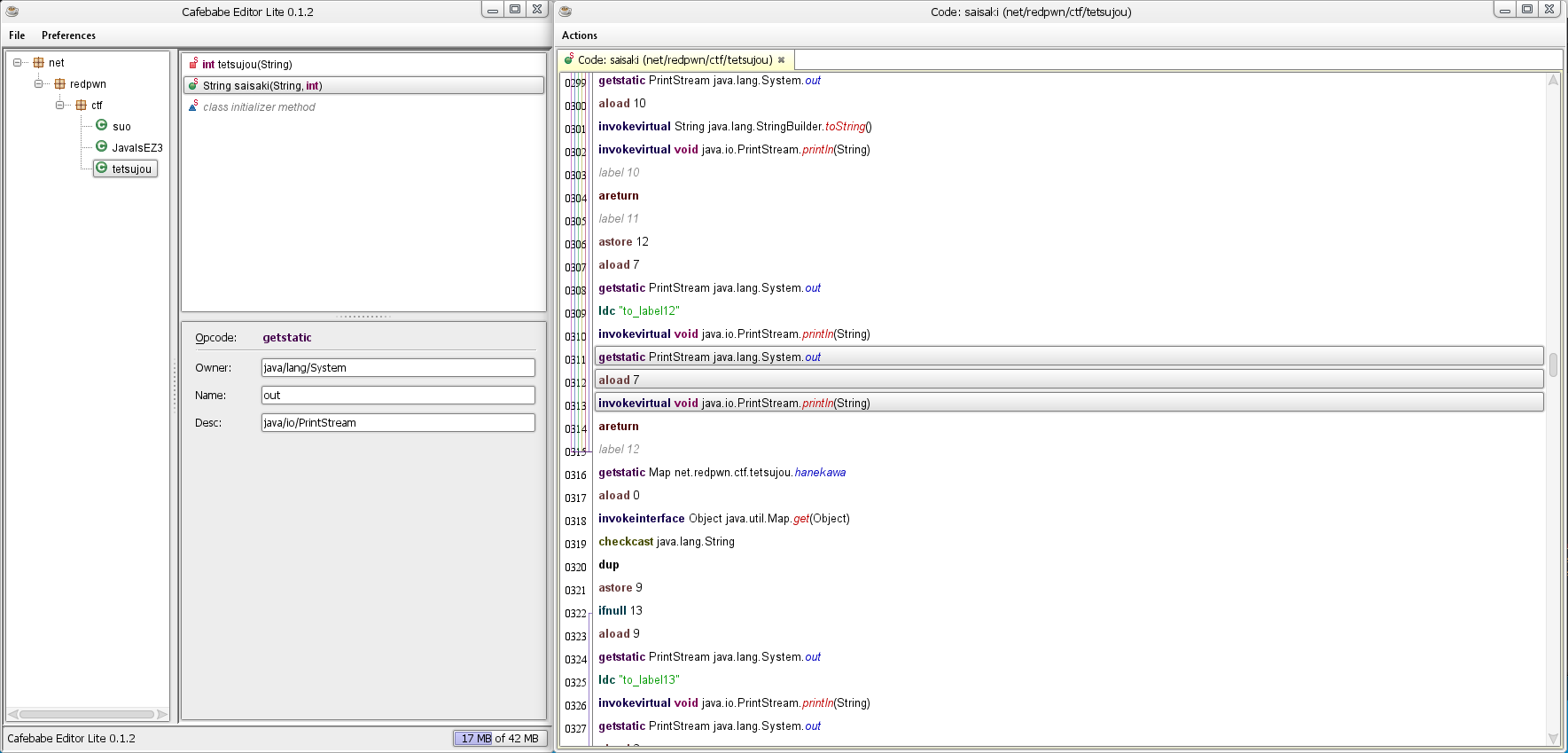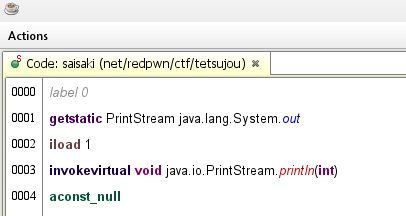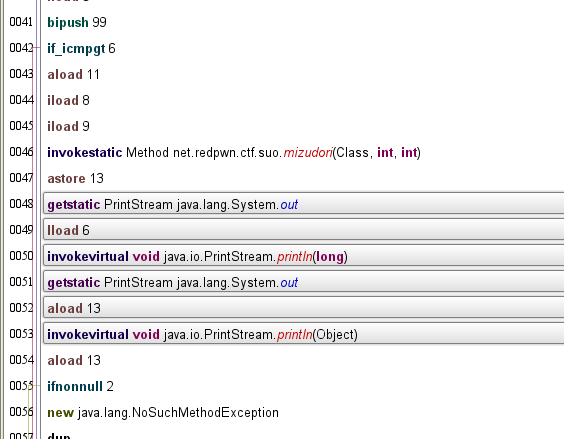javaisez3
Categories: re
2021-07-12
by not_really
3rd round of your local Java rev! Note: This requires Java 11 and above to run.
Author: ItzSomebody
3rd round of your local Java rev! Note: This requires Java 11 and above to run.
Author: ItzSomebody
Ah yes, another fun obfuscated java challenge.
As for this jar specifically, it seems that the class files in the jar (zip) are actually directories. Some tools won’t detect the classes in the first place (jd-gui) and decompilers on javadecompilers.com will just straight up refuse to do anything.
I actually learned about two tools from a previous ctf that are great for these kinds of things.
For decompilation, recaf works great, and it was able to open the jar just fine and even decompile the code when switching to fernflower. Recaf has a bytecode editor, but it and java bytecode viewer both corrupt the jar with a class not found ?????? error when run.
So for bytecode editing, the only tool I could get to successfully edit without corruption was cafebabe. It’s actually pretty jank to work with since most functionality is behind right click menus without shortcuts. It also will occasionally corrupt the jar as well, but that’s why we have backups.
Deobfuscating the code
So even though we can decompile the code, it’s still obfuscated. Here’s the main method as an example:
public static void main(String[] var0) {
redpwnCTF2021 var10000 = (redpwnCTF2021)null;
if (var0.a<invokedynamic>(var0, tetsujou.saisaki("⧈㚟⧒ᣚ⧔㚟⧂ᢄ⧑㚔⦈ᢗ⧒㚜⦈ᢾ⧇㚌⧇ᢽ⧕㚿⧼ᣇ", 322826692), -4280091229029863812L) == 0) {
try {
tetsujou.saisaki("ᘾ३ᘢ❧ᘬदᘧ❱ᘽ०ᘳ✨ᘁुᘙ❧ᘺ३ᘳ❣ᘦ", 649776694).a<invokedynamic>(tetsujou.saisaki("ᘾ३ᘢ❧ᘬदᘧ❱ᘽ०ᘳ✨ᘁुᘙ❧ᘺ३ᘳ❣ᘦ", 649776694), 8560971300846057061L).a<invokedynamic>(tetsujou.saisaki("ᘾ३ᘢ❧ᘬदᘧ❱ᘽ०ᘳ✨ᘁुᘙ❧ᘺ३ᘳ❣ᘦ", 649776694).a<invokedynamic>(tetsujou.saisaki("ᘾ३ᘢ❧ᘬदᘧ❱ᘽ०ᘳ✨ᘁुᘙ❧ᘺ३ᘳ❣ᘦ", 649776694), 8560971300846057061L), tetsujou.saisaki("鯈蒟鯔ꪑ鯚蓐鯑ꪇ鯋蒐鯅꫞鯷蒷鯯ꪑ鯌蒟鯅ꪕ鯐", -784448576), 1235598990591485937L);
null.a<invokedynamic>((Object)null, tetsujou.saisaki("듿ꮙ듀薒듕ꯝ듏薖듙ꮂ듀藒뒌ꮒ듅薒듀ꮉ뒁薝듄ꮅ듞薒뒀ꯐ듟薗듀ꮜ듕藓듎ꮙ듀薒듕ꯐ듄薗듀ꮙ듏薖듙ꮂ듀藐뒂ꯞ뒌薩듃ꮟ듃薖뒍듒薿뒌ꮓ듉薌듘ꮑ듅薐뒌ꮧ듍薐듋ꮃ듄薛듂ꮗ뒌薸듙ꮞ듉薌듍ꮜ뒌薮듍ꮂ듀薑듞ꯐ듈薗듞ꮕ듏薊듃ꮂ뒦藴뒄ꮤ듄薗듟ꯐ듅薍뒌ꮞ듃薊뒌ꮄ듄薛뒌ꮖ듀薟듋ꯜ뒌薜듘ꮇ뒅", -1851298610), tetsujou.saisaki("䃤徳䃸熽䃶忼䃽熫䃧徼䃩燲䃄徝䃾熨䃧徽䃠熌䃯徼䃫", -558917396), -8331272066798825690L);
} catch (Throwable var5) {}
} else {
if (var0[0].b<invokedynamic>(var0[0], tetsujou.saisaki("Ꙛ뤍Ꙇ霃ꘞ뤀ꙑ霌ꙗ륂ꙣ霖Ꙃ뤅Ꙟ霅", -1637188014), -4751795797312301073L) != 48) {
tetsujou.saisaki("����", -2016726913).d<invokedynamic>(tetsujou.saisaki("����", -2016726913), 474225325441265L).b<invokedynamic>(tetsujou.saisaki("����", -2016726913).d<invokedynamic>(tetsujou.saisaki("����", -2016726913), 474225325441265L), tetsujou.saisaki("ᮈҘᯃ⪞ᯄҟᯐ⪕ᮈӞ⪟ᯗәᯔ⪕ᮂҜᯇ⪕ᯌӞᯒ⪂ᯃҐᯉ⪕ᯆӟ", -846806080), tetsujou.saisaki("龜퓀陼풏퓏퓓龜", 801127825), -1351703383126743055L);
return;
}
String var6 = tetsujou.saisaki("徺䃐征滑徘䃅循滖徟䃝徯滚從䃅循滖徟䃝徲溏忚䂞応溊", 1677756303);
char[] var1 = var6.b<invokedynamic>(var6, tetsujou.saisaki("ꕝ먊ꕁ鐄ꔙ먇ꕖ鐋ꕐ멅ꕤ鐑ꕅ먂ꕙ鐂", -1768915627), 3921157978488572744L);
char[][] var2 = new char[][]{var1, null, null};
int var3 = var0[0].b<invokedynamic>(var0[0], tetsujou.saisaki("ᓽபᓡ▤ᒹᓶ▫ᓰᓄ▱ᓥᓹ▢", -789459723), -4751795797312301073L) / 2;
for(int var4 = 0; var4 < 2; ++var4) {
int var10001 = var4 + 1;
String var10002 = var0[0].b<invokedynamic>(var0[0], var4 * var3, (var4 + 1) * var3, tetsujou.saisaki("쒲쒽쒧쒴", -236704285), 2278661231839426149L);
var2[var10001] = var10002.b<invokedynamic>(var10002, tetsujou.saisaki("犽淪犡䏤狹淧状䏫犰涥犄䏱犥淢犹䏢", 1785375413), 3921157978488572744L);
}
var2.a<invokedynamic>(var2, tetsujou.saisaki("⏙㲎⏃ዋ⏅㲎⏓ን⏀㲅⎙ኆ⏃㲍⎙ኯ⏖㲝⏖ኬ⏄㲮⏭ዖ", 411433941), -4036077825718603401L);
if (var2.a<invokedynamic>(var2, tetsujou.saisaki("붢ꋵ붸貰붾ꋵ붨賮붻ꋾ뷢賽붸ꋶ뷢賔붭ꋦ붭賗붿ꋕ붖貭", 1254712750), -4328141322681971509L) & var2.a<invokedynamic>(var2, tetsujou.saisaki("앬�앶앰�앦앵�씬앶�씬앣�앣앱�았", -723903136), 8504114058794503371L) & var0[0].b<invokedynamic>(var0[0], tetsujou.saisaki("뷹ꊮ뷥負붽ꊣ뷲貯뷴ꋡ뷀貵뷡ꊦ뷽貦", 778462705), 634352354493306863L) == 1101317042) {
tetsujou.saisaki("㨴╣㨨୭㩰╮㨿ୢ㨹┬㨍୵㨭╶㨻ୡ", -1278287300).d<invokedynamic>(tetsujou.saisaki("㨴╣㨨୭㩰╮㨿ୢ㨹┬㨍୵㨭╶㨻ୡ", -1278287300), 474225325441265L).b<invokedynamic>(tetsujou.saisaki("㨴╣㨨୭㩰╮㨿ୢ㨹┬㨍୵㨭╶㨻ୡ", -1278287300).d<invokedynamic>(tetsujou.saisaki("㨴╣㨨୭㩰╮㨿ୢ㨹┬㨍୵㨭╶㨻ୡ", -1278287300), 474225325441265L), tetsujou.saisaki("㎙ⳮ㎯˼㎿Ⲩ㏺ʨ㎔⳩㎭ʨ㎣⳩㎯ʨ㎱⳨㎵˿㏺Ⳬ㎣ʨ㎩ⳣ㎹˺㎿Ⳳ", -921572424), tetsujou.saisaki("ꊒ뷅ꊎ鏋ꋖ뷍ꊗ鎄ꊨ뷖ꊑ鏄ꊌ뷷ꊌ鏘ꊝ뷅ꊕ", -266634598), -1351703383126743055L);
} else {
tetsujou.saisaki("쎴�쎨쏰�쎿쎹�쎍쎭�쎻", 1400642492).d<invokedynamic>(tetsujou.saisaki("쎴�쎨쏰�쎿쎹�쎍쎭�쎻", 1400642492), 474225325441265L).b<invokedynamic>(tetsujou.saisaki("쎴�쎨쏰�쎿쎹�쎍쎭�쎻", 1400642492).d<invokedynamic>(tetsujou.saisaki("쎴�쎨쏰�쎿쎹�쎍쎭�쎻", 1400642492), 474225325441265L), tetsujou.saisaki("ͨᱸ̣㉾̤᱿̰㉵ͨ᰾̛㉿̷̴㉵͢ᱼ̧㉵̬᰾̲㉢̣ᱰ̩㉵̦᰿", -662578400), tetsujou.saisaki("숄쉋숋숗", -501863595), -1351703383126743055L);
}
}
}
Not great. You really can’t tell what’s going on at all.
There’s two classes decrypting things:
- tetsujou
tetsujou.saisakidecrypts a string
- suo
.a/b/c<invokedynamic>decrypts a method.d/e/f<invokedynamic>decrypts a field
With enough time you could probably write some code to do the decryption, but with the unicode strings possibly decoding wrong and the stack trace checking code in saisaki, I felt it would be better to just print out the strings. You can do this with
getstatic PrintStream java.lang.System.out
[value here]
invokevirtual void java.io.PrintStream.println(String)
It’s sort of a pain to do this manually, since even though you can select multiple instructions, only one can be right clicked on at a time, and therefore copied at a time. I wrote an autohotkey script to speed things up, but it was still tedious.

This prints out the constants used, but doesn’t say which ones go where. Thankfully, we have a constant value that is passed in from earlier that we can use to match up the correct strings.

example output from this patch:
-2100823452
net.redpwn.ctf.JavaIsEZ3
857220391
java.lang.reflect.Array
...
so you can find strings that look like this:
tetsujou.saisaki("᭘⨯ᭂ፺᭄⨯᭒ጤᭁ⨤ᬘጷᭂ⨬ᬘጞ᭗⨼᭗ጝᭅ⨏᭬፧", -2100823452)
and replace them with this:
"net.redpwn.ctf.JavaIsEZ3"
We can also do the same thing for sui.teori to print out the method and fields it loads as well.

This makes the main function slightly more readable.
public static void main(String[] var0) {
redpwnCTF2021 var10000 = (redpwnCTF2021)null;
if (var0.a<invokedynamic>(var0, "net.redpwn.ctf.JavaIsEZ3", -4280091229029863812L) == 0) { //hachikuji (check array length)
try {
"javax.swing.UIManager".a<invokedynamic>("javax.swing.UIManager", 8560971300846057061L).a<invokedynamic>("javax.swing.UIManager".a<invokedynamic>("javax.swing.UIManager", 8560971300846057061L), "javax.swing.UIManager", 1235598990591485937L);
null.a<invokedynamic>((Object)null, "Silly-churl, billy-churl, silly-billy hilichurl... Woooh!\n~A certain Wangsheng Funeral Parlor director\n\n(This is not the flag, btw)", "javax.swing.JOptionPane", -8331272066798825690L);
} catch (Throwable var5) {}
} else {
if (var0[0].b<invokedynamic>(var0[0], "java.lang.String", -4751795797312301073L) != 48) { //length
"java.lang.System".d<invokedynamic>("java.lang.System", 474225325441265L).b<invokedynamic>("java.lang.System".d<invokedynamic>("java.lang.System", 474225325441265L), "*fanfare* You've been pranked!", "*fanfare* You've been pranked!", -1351703383126743055L);
return;
}
String var6 = "WalnutGirlBestGirl_07/15";
char[] var1 = var6.b<invokedynamic>(var6, "java.lang.String", 3921157978488572744L); //toCharArray
char[][] var2 = new char[][]{var1, null, null};
int var3 = var0[0].b<invokedynamic>(var0[0], "java.lang.String", -4751795797312301073L) / 2; //length
for(int var4 = 0; var4 < 2; ++var4) {
int var10001 = var4 + 1;
String var10002 = var0[0].b<invokedynamic>(var0[0], var4 * var3, (var4 + 1) * var3, "java.lang.String", 2278661231839426149L); //substring
var2[var10001] = var10002.b<invokedynamic>(var10002, "java.lang.String", 3921157978488572744L); //toCharArray
}
var2.a<invokedynamic>(var2, "net.redpwn.ctf.JavaIsEZ3", -4036077825718603401L); //kanbaru
if (var2.a<invokedynamic>(var2, "net.redpwn.ctf.JavaIsEZ3", -4328141322681971509L) & var2.a<invokedynamic>(var2, "net.redpwn.ctf.JavaIsEZ3", 8504114058794503371L) /*sengoku*/ & var0[0].b<invokedynamic>(var0[0], "java.lang.String", 634352354493306863L) /*hashCode*/ == 1101317042) {
//win (we can't see strings yet since this hasn't been executed)
tetsujou.saisaki("㨴╣㨨୭㩰╮㨿ୢ㨹┬㨍୵㨭╶㨻ୡ", -1278287300).d<invokedynamic>(tetsujou.saisaki("㨴╣㨨୭㩰╮㨿ୢ㨹┬㨍୵㨭╶㨻ୡ", -1278287300), 474225325441265L).b<invokedynamic>(tetsujou.saisaki("㨴╣㨨୭㩰╮㨿ୢ㨹┬㨍୵㨭╶㨻ୡ", -1278287300).d<invokedynamic>(tetsujou.saisaki("㨴╣㨨୭㩰╮㨿ୢ㨹┬㨍୵㨭╶㨻ୡ", -1278287300), 474225325441265L), tetsujou.saisaki("㎙ⳮ㎯˼㎿Ⲩ㏺ʨ㎔⳩㎭ʨ㎣⳩㎯ʨ㎱⳨㎵˿㏺Ⳬ㎣ʨ㎩ⳣ㎹˺㎿Ⳳ", -921572424), tetsujou.saisaki("ꊒ뷅ꊎ鏋ꋖ뷍ꊗ鎄ꊨ뷖ꊑ鏄ꊌ뷷ꊌ鏘ꊝ뷅ꊕ", -266634598), -1351703383126743055L);
} else {
"java.lang.System".d<invokedynamic>("java.lang.System", 474225325441265L).b<invokedynamic>("java.lang.System".d<invokedynamic>("java.lang.System", 474225325441265L), "*fanfare* You've been pranked!", "java.io.PrintStream", -1351703383126743055L); //println
}
}
}
Cleaned up looks like this:
String walnut = "WalnutGirlBestGirl_07/15";
char[] walArr = walnut.toCharArray();
char[][] thrArr = new char[][]{walArr, null, null};
int inpStrLen = args[0].length() / 2;
for (int i = 0; i < 2; i++) {
String subStr = args[0].substring(i * inpStrLen, (i + 1) * inpStrLen);
thrArr[i+1] = subStr.toCharArray();
}
kanbaru(thrArr);
if (oshino(thrArr) && sengoku(thrArr) && args[0].hashCode() == 1101317042) {
//win
} else {
System.out.println("*fanfare* You've been pranked!");
}
Seems simple, thrArr contains a random constant string and two halves of the input. This array is passed into two functions and if they are both true, and the hash of the input matches, then we win.
Kanbaru does xoring on the input, here’s what it looks like:
private static void kanbaru(char[][] inp) {
//redpwnCTF2021 var10000 = (redpwnCTF2021)null;
for (int i = 0; i < inp.hachikuji() - 1; i++) {
char[] var2 = inp[i];
char[] var3 = inp[i + 1];
for (int j = 0; j < var2.hachikuji(); j++) {
var3[j] ^= var2[j];
}
}
}
The second item in the inp array is xor’d with the first item, then the third item is xor’d with the second item. So we need to figure out the first half first, then we can xor the second with the first half to get the final flag.
oshino (checks first half of flag)
private static boolean oshino(char[][] inp) {
//redpwnCTF2021 var10000 = (redpwnCTF2021)null;
char[] inp1 = inp[1];
String inp1Str = new String(inp1);
if (inp1Str.hashCode() != 998474623) {
return false;
} else {
int[] reg = new int[6];
int j = 0;
//load input in four byte chunks and xor with 0x07150715
for (int i = 0; i < hachikuji(inp1); i += 4) {
reg[j++] = (
inp1[i] << 24 |
inp1[i + 1] << 16 |
inp1[i + 2] << 8 |
inp1[i + 3]
) ^ 118818581;
}
int pos = 0;
int[] stack = new int[15];
int stackPos = 0;
boolean retValue = true;
while (true) {
byte opcode = araragi[pos];
byte var9;
int var10;
int var11;
switch (opcode) {
case 0: //pop into reg
var9 = araragi[pos + 1];
stackPos--;
reg[var9] = stack[stackPos];
pos += 2;
break;
case 1: //push from reg
var9 = araragi[pos + 1];
stack[stackPos++] = reg[var9];
pos += 2;
break;
case 2: //return
return retValue;
case 3: //push int constant
var11 = araragi[pos + 1] << 24 | araragi[pos + 2] << 16 |
araragi[pos + 3] << 8 | araragi[pos + 4];
stack[stackPos++] = var11;
pos += 5;
break;
case 4: //compare top two stack values
stackPos--;
var11 = stack[stackPos];
stackPos--;
var10 = stack[stackPos];
retValue &= var10 == var11;
pos++;
break;
case 5: //push short constant
var11 = araragi[pos + 1] << 8 | araragi[pos + 2];
stack[stackPos++] = var11;
pos += 3;
break;
case 6: //push byte constant
var9 = araragi[pos + 1];
stack[stackPos++] = var9;
pos += 2;
}
}
}
}
This function and the second half checker are both tiny “vms” if you want to call them that. The code that oshino executes is something like this:
pushInt 0x58480753 (3, 88, 72, 7, 83)
pushInt 0x02460746 (3, 2, 70, 7, 70)
pushInt 0x2B0A2E4C (3, 43, 10, 46, 76)
pushInt 0x2A007505 (3, 42, 0, 117, 5)
pushInt 0x09057118 (3, 9, 5, 113, 24)
pushInt 0x36180A1C (3, 54, 24, 10, 28)
pushReg 0 (1, 0)
compareStack (4)
pushReg 1 (1, 1)
compareStack (4)
pushReg 2 (1, 2)
compareStack (4)
pushReg 3 (1, 3)
compareStack (4)
pushReg 4 (1, 4)
compareStack (4)
pushReg 5 (1, 5)
compareStack (4)
return (2)
It seems to do a simple compare with some ints, but we have two xors to worry about: the 0x07150715 constant in this function but also the walnut constant in the array.
str(xor(0x36180A1C, 0x07150715, int32("Waln"))) = "flag"
str(xor(0x09057118, 0x07150715, int32("utGi"))) = "{d1d"
str(xor(0x2A007505, 0x07150715, int32("rlBe"))) = "_y0u"
str(xor(0x2B0A2E4C, 0x07150715, int32("stGi"))) = "_kn0"
str(xor(0x02460746, 0x07150715, int32("rl_0"))) = "w?_c"
str(xor(0x58480753, 0x07150715, int32("7/15"))) = "hr1s"
first half = flag{d1d_y0u_kn0w?_chr1s
sengoku (checks second half of flag)
private static boolean sengoku(char[][] inp) {
//redpwnCTF2021 var10000 = (redpwnCTF2021)null;
char[] inp2 = inp[2];
long[] reg = new long[15];
int j = 0;
for(int i = 0; i < inp2.hachikuji(); i += 8) {
reg[j++] = (
(long)inp2[i] << 56 | (long)inp2[i + 1] << 48 |
(long)inp2[i + 2] << 40 | (long)inp2[i + 3] << 32 |
(long)inp2[i + 4] << 24 | (long)inp2[i + 5] << 16 |
(long)inp2[i + 6] << 8 | (long)inp2[i + 7]
) ^ 0x0302071503020715;
}
String inp2Str = new String(inp2);
reg[j] = (long)inp2Str.hashCode();
int pos = 0;
long[] stack = new long[15];
int stackPos = 0;
while (true) {
int opcode = hitagi[pos];
int var8;
int var9;
long var10;
switch (opcode) {
case 0: //push long constant
var10 = (long)hitagi[pos + 1] << 56 | (long)hitagi[pos + 2] << 48 |
(long)hitagi[pos + 3] << 40 | (long)hitagi[pos + 4] << 32 |
(long)hitagi[pos + 5] << 24 | (long)hitagi[pos + 6] << 16 |
(long)hitagi[pos + 7] << 8 | (long)hitagi[pos + 8];
stack[stackPos++] = var10;
pos += 9;
break;
case 1: //push int constant
var10 = (long)hitagi[pos + 1] << 24 | (long)hitagi[pos + 2] << 16 |
(long)hitagi[pos + 3] << 8 | (long)hitagi[pos + 4];
stack[stackPos++] = var10;
pos += 5;
break;
case 2: //push short constant
var10 = (long)hitagi[pos + 1] << 8 | (long)hitagi[pos + 2];
stack[stackPos++] = var10;
pos += 3;
break;
case 3: //push byte constant
var10 = (long)hitagi[pos + 1];
stack[stackPos++] = var10;
pos += 2;
break;
case 4: //reg a equals reg b
var8 = hitagi[pos + 1];
var9 = hitagi[pos + 2];
reg[0] = reg[var8] == reg[var9] ? 0L : 1L;
pos += 3;
break;
case 5: //jump
pos = hitagi[pos + 1];
break;
case 6: //jump if eqz
if (reg[0] == 0L) {
pos = hitagi[pos + 1];
} else {
pos += 2;
}
break;
case 7: //jump if neqz
if (reg[0] != 0L) {
pos = hitagi[pos + 1];
} else {
pos += 2;
}
break;
case 8: //xor reg a and reg b
var8 = hitagi[pos + 1];
var9 = hitagi[pos + 2];
reg[var8] ^= reg[var9];
pos += 3;
break;
case 9: //or reg a and reg b
var8 = hitagi[pos + 1];
var9 = hitagi[pos + 2];
reg[var8] |= reg[var9];
pos += 3;
case 16: //and reg a and reg b
var8 = hitagi[pos + 1];
var9 = hitagi[pos + 2];
reg[var8] &= reg[var9];
pos += 3;
break;
case 17: //pop into reg
var8 = hitagi[pos + 1];
--stackPos;
reg[var8] = stack[stackPos];
pos += 2;
break;
case 18: //push from reg
var8 = hitagi[pos + 1];
stack[stackPos++] = reg[var8];
pos += 2;
break;
case 19: //return
return reg[0] == 0L;
default:
break;
}
}
}
Much of the same here, including the xor on the input. Just slightly different instructions.
pushInt 0x66D63918 (1, 102, 214, 57, 24)
pushLong 0x767058766B6E322E (0, 118, 112, 88, 118, 107, 110, 50, 46)
pushLong 0x7143146A706E1F21 (0, 113, 67, 20, 106, 112, 110, 31, 33)
pushLong 0x6D667943394D396D (0, 109, 102, 121, 67, 57, 77, 57, 109)
popIntoReg 4 (17, 4)
popIntoReg 5 (17, 5)
popIntoReg 6 (17, 6)
popIntoReg 7 (17, 7)
jmp label2 (5, 47)
label1:
loadByte 1 (3, 1)
popIntoReg 0 (17, 0)
return (19)
label2:
cmp 0, 4 (4, 0, 4)
jmpNeq label1 (7, 42)
cmp 1, 5 (4, 1, 5)
jmpNeq label1 (7, 42)
cmp 2, 6 (4, 2, 6)
jmpNeq label1 (7, 42)
cmp 3, 7 (4, 3, 7)
jmpNeq label1 (7, 42)
return (19)
Other than xoring with the first half of the flag, it’s the same as oshino. Note that at this point the first half of the array has already been xor’d with walnut. There’s also a hash of the string as input into this function, but we can pretty much ignore it since if the rest of the checks are correct, the hashcode will be too.
WalnutGirlBestGirl_07/15
str(xor(0x6D667943394D396D, 0x0302071503020715,
int64("WalnutGi"), int64("flag{d1d"))) = "_is_4_Hu"
str(xor(0x7143146A706E1F21, 0x0302071503020715,
int64("rlBestGi"), int64("_y0u_kn0"))) = "_Tao_s1m"
str(xor(0x767058766B6E322E, 0x0302071503020715,
int64("rl_07/15"), int64("w?_chr1s"))) = "p!_0715}"
second half = _is_4_Hu_Tao_s1mp!_0715}
Plugging it in
> java -jar javaisez3.jar flag{d1d_y0u_kn0w?_chr1s_is_4_Hu_Tao_s1mp!_0715}
Chute. Now you know my secret
To be honest, I was kind of surprised this only got two solves but rp2sm got eight. Sorry java.